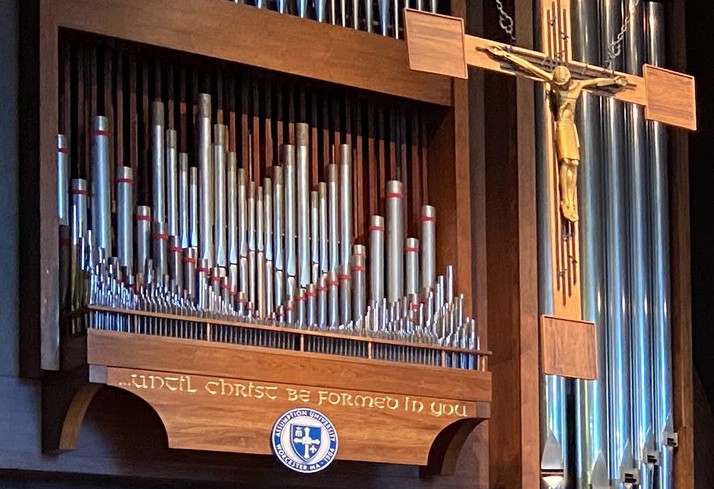News
AA-Info n.5 - July 2024
“...until Christ is formed in you” (Ga 4, 19)

EDITORIAL
Fr. Ngoa Ya Tshihemba
Superior General of the Augustinians of the Assumption
Last June’s Plenary General Council (CGP) was held in the United States of America. It took place on the campus of Assumption University. The Emmanuel House community is located on the same campus. Those who have already visited the site will know that, as you enter the university’s central chapel, you see directly above the altar these words from the Apostle Saint Paul to the Galatians: “Until Christ be formed in you! ‘’ For an Assumptionist, these words in the center of a university chapel should be more than just a reminder.
They remind us of an idea, a preoccupation, a mission central to the life and spirituality of our founder: to form Christ in souls. Education continues to be a priority apostolic project. As observed during the 34th General Chapter, from kindergarten to university, our congregation welcomes some 30,000 students each year in 88 educational establishments to face a variety of challenges: ignorance, secularization, unbelief, indifference, individualism, social discrimination, insecurity, poverty, materialism (cf. Acts n. 178).
Every day, during the time of meditation before morning Mass, these words “Until Christ is formed in you” were above the altar, in front of me. They nourished my prayer, motivated my hope, but also raised questions deep within me, not only as an Assumptionist religious, but above all as the successor of the man who had found in these words the raison d’être of all Christian and religious education. The formation of Jesus Christ in souls,” said our Founder, “is the sole purpose of education. And he continued: “When we have set young souls on the path where they can approach the perfections of the God- Man, we will have given them the most admirable preparation for life.” (E.S., p. 235-236.)
In a letter to Marie Eugénie (December 14, 1868), D’Alzon explains that the triple incarnation of Jesus Christ - born in the crib, on the altar and in our souls - is a mystery that should absorb us whole. All of us should be absorbed in bringing Jesus Christ to birth in us and around us, especially in young people. Since this cannot be done without the “pain of childbirth”, this question from Fr. d’Alzon can serve as a key for rereading, especially for those directly involved in the education of young people: “Do I have for them the suffering of the Apostle who sought to give birth to Jesus Christ in the souls he was charged with evangelizing?” (E.S. p. 99). The pain of childbirth is only endurable if we believe in what we hope for. Jesus gives an example of this in the Gospel: “The woman who gives birth is in pain because her hour has come. But when the child is born, she remembers her suffering no more, and is overjoyed that a human being has come into the world.” (Jn 16, 21) Yes, no one can take away our joy when we have accomplished the noble task of preparing the young people we accompany for real life.
For the “mystical incarnation” to succeed, that is, the double birth of Jesus in our souls and those of others, Fr. d’Alzon proposes Mary as a model in her obedience, her humility, her contemplation and her love. How can we live these virtues in a society where they are less and less esteemed? Today’s young people, and those of us who accompany them, are faced with a number of challenges that also affect the religious experience: pressure and manipulation through social networks, axiological subjectivism, individualism, questioning of authority, mimetic desire, and so on. While everybody seems to agree on the importance of freedom in life, both on an individual and societal level, the question still remains: what meaning should we give to this fundamental value?
There’s no reason to give up. On the contrary, this is the time to live serenely what we believe. When the image of God becomes blurred, when the name of Jesus Christ no longer means anything to people, when religious experience seems to have slipped off the list of essential things, especially for young people, then comes the urgent need to repeat with Fr. d’Alzon: “I cannot love Jesus Christ without wanting all creatures to love him, and this is the reason for what must make up the apostolic character of my life.” (E.S. p. 123) It is therefore with this assurance, faith and hope that the message must be proclaimed with fidelity and creativity, because the story of Jesus touches our deepest desires for love, freedom and happiness. Yes, even if it must come with a certain pain of childbirth, I urge each of us to carry the torch of constant pursuit of our founder’s holy desire: to form Christ in souls.
To read the full AA-Info n°5, follow this link...